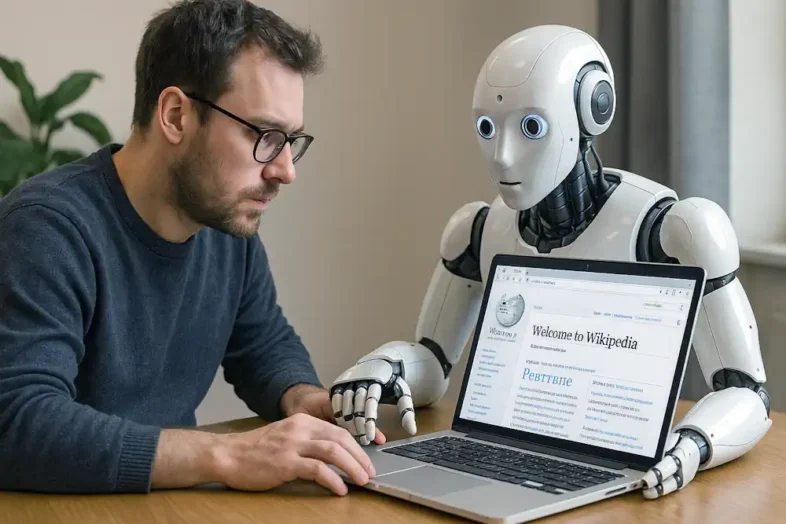As artificial intelligence reshapes the American information landscape, the nonprofit behind the world’s largest encyclopedia has charted a path that bucks the trend of AI replacing human workers. Instead, their newly announced three-year strategy positions AI as an assistive technology designed to enhance the work of the volunteer community, which has made the platform a cornerstone of digital knowledge in the United States and globally.
Listen to a Summary of this Article
Table of Contents
Prioritizing human judgment in an era of automation
The Wikimedia Foundation revealed Wednesday that its approach to AI will focus on “removing technical barriers” for editors, moderators, and content patrollers. This stands in stark contrast to the wave of AI implementations across U.S. media and technology companies that have raised concerns about job displacement in content creation fields. The strategy explicitly frames AI as a complement to human expertise rather than a replacement.
“We believe that our future work with AI will be successful not only because of what we do, but how we do it,” wrote Chris Albon, the director of machine learning, and Leila Zia, Director and Head of Research at the Wikimedia Foundation, in their announcement. Their approach emphasizes values that resonate with American concerns about AI ethics, including “privacy and human rights” and “human agency.”
How Wikipedia’s AI tools will support volunteer editors
The foundation has identified specific applications where generative AI can excel without undermining the community-driven model that has made Wikipedia a trusted resource for millions of Americans. AI-assisted workflows will automate tedious tasks that currently consume volunteer time, potentially addressing the burnout issues that have challenged online communities.
Information discoverability will also see AI enhancements, freeing editors to focus on the deliberative processes that ensure factual accuracy and neutrality—qualities that have become increasingly valuable as misinformation proliferates across American social media platforms. This approach acknowledges that the consensus-building that shapes Wikipedia entries requires uniquely human judgment.
Additional AI applications will include automated translation assistance, which is particularly valuable for connecting knowledge across America’s multilingual communities and streamlining the onboarding process for new volunteers, potentially diversifying the contributor base.
Wikipedia’s role in an AI-powered information ecosystem
The announcement comes at a critical moment when generative AI systems like ChatGPT and Google’s Bard have raised questions about information quality and source integrity across the U.S. tech landscape. Wikipedia’s knowledge base has become even more vital as these AI systems frequently draw upon its content, sometimes reproducing its errors or “hallucinating” information entirely.
By maintaining human oversight while leveraging AI capabilities, Wikipedia’s approach offers a potential model for American institutions grappling with similar questions about automation and human expertise. The foundation’s commitment to using “open-source or open-weight AI” also aligns with growing calls in U.S. tech policy circles for greater transparency in AI systems.
Can Wikipedia’s community-centered approach become a blueprint?
The foundation’s emphasis on “a nuanced approach to multilinguality” acknowledges America’s diverse linguistic landscape and the importance of making knowledge accessible across language barriers. This stands in contrast to the predominantly English-focused development of many commercial AI systems in the United States.
Wikipedia’s strategy represents a thoughtful middle path in the often polarized American discourse around AI, where fears of job displacement compete with techno-optimism. By designing AI tools specifically to support human volunteers rather than replace them, the organization demonstrates how technology can enhance collective knowledge-building rather than undermine it.
As American institutions from newsrooms to universities wrestle with their own AI strategies, Wikipedia’s approach offers valuable lessons in maintaining human judgment at the center of information systems while still harnessing technological advances to expand access to knowledge.


